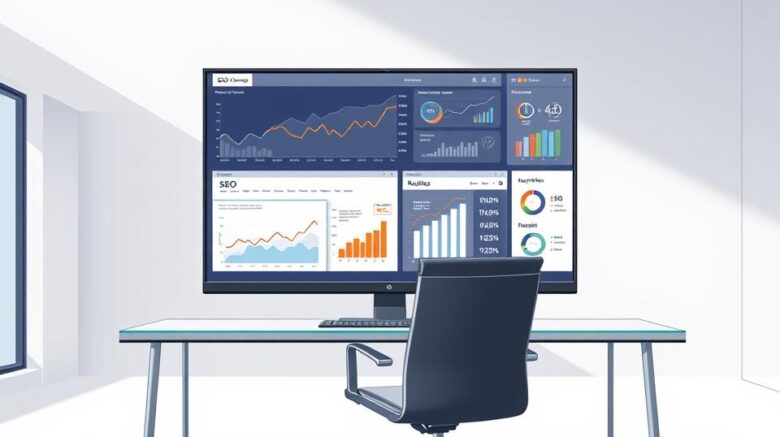Boost Your SEO Performance with Our Specialist Support
Have you ever noticed that 93% of web interactions kick off via a search engine? This statistic underscores how vital search engine optimization (SEO) is for companies. A thoughtfully designed SEO approach can markedly improve your website’s position. Thus, employing top SEO practices that increase organic traffic is essential. At Marketing1on1.com, our mission is to lead you through the nuances of SEO.
Our goal is to assist you in refining your content for both audiences and search engines. This ensures better SEO firm visibility and engagement. With our detailed guidance, you can fully leverage your online presence.

Learning the Core Principles of SEO
SEO, or search engine optimization, is key to making a website more visible. By mastering SEO basics, businesses can boost their search engine ranking. Crafting content aligned with user intent assists search engines in efficiently crawling and indexing your site.
Knowing how search engines work is essential for SEO mastery. They apply intricate scoring systems to judge your site’s content, layout, and applicability. A logically arranged website both delights users and streamlines search crawler indexing.
Key SEO practices include speeding up pages, guaranteeing mobile compatibility, and improving accessibility. Neglecting these aspects can harm a site’s ranking, impacting its credibility and traffic.
Spending time on SEO basics lays a solid groundwork for advanced strategies. Since the online landscape continually shifts, keeping up with best practices is essential. This guarantees your site stays efficient and prominent in search listings.
Building a Powerful SEO Plan
Creating a successful SEO strategy involves several key steps. The first step is performing a comprehensive site audit. Platforms such as Google Analytics and SEMrush reveal your site’s pros and cons. This step is vital for pinpointing areas needing improvement.
Assessing competitor metrics also plays a pivotal role. Spotting opportunities in the market lets you draw better-qualified visitors. This approach underscores defining explicit goals to focus your tactics.
Developing a keyword strategy is another important aspect. Target low-competition phrases that align with user intent. Regularly monitoring and adjusting your strategy is necessary to stay ahead in the dynamic digital world.
Keyword Research and Its Impact on SEO
Keyword research is the foundation of a successful SEO strategy. This means discovering the queries your prospects enter online. Tools like Google Keyword Planner and Ahrefs help marketers gather relevant keywords that match user intent. This knowledge empowers you to develop content that answers user queries directly.
Focusing on intent-driven keywords can dramatically boost your web presence. Content that effectively uses these keywords has a higher chance of ranking better, attracting more organic traffic. Regularly updating your keyword research keeps your content relevant, meeting your audience’s changing needs.
| Keyword Research Tools | Key Features | User Intent Alignment |
|---|---|---|
| Google Keyword Planner | Free access | Ideal for AdWords campaigns |
| Ahrefs | SERP tracking | Helps in identifying actionable keywords |
| SEMrush | Competitive analysis | Analyzes competitors to refine targeting strategy |
Expertise in keyword analysis empowers marketers to fine-tune content, raising interaction and conversion metrics. This continuous effort is essential for sustaining and improving your SEO performance.
On-Page Optimization Techniques
On-site SEO tactics are fundamental to boosting your site’s exposure and positioning. Begin by refining your titles, headers, and copy around chosen keywords. It signals to search bots the main focus of every page. It confirms your content’s authority and relevancy.
Metadata, like meta descriptions, greatly impacts click-through rates. Writing compelling meta snippets entices searchers to visit your page. By continually refreshing metadata, you demonstrate to search engines that your pages stay current.
Proper layout enhances readability, guiding users smoothly through your pages. Strategic internal links guide users to additional pages, enriching their journey. Together, these techniques strengthen your site’s SEO profile.
External SEO Strategies for Better Ranking
External SEO efforts play a crucial role in enhancing your site’s authority and reach. It mainly involves acquiring backlinks from trusted sources, which boosts your authority. Solid backlinks signal to crawlers that your pages offer genuine value. This can lead to a significant jump in your website’s ranking.
Active social engagement supports your off-page optimization efforts. By posting SEO company insightful content, you build and maintain customer interest. Such engagement often inspires users to reference your site with backlinks. Joining niche forums and groups often results in additional organic links.
Executing PR initiatives remains a potent off-page strategy. They may secure mentions on top-tier domains, serving as endorsements. Over time, these efforts build a stronger online presence.
| Strategy | Benefits |
|---|---|
| Backlinks from authority sites | Improves search rankings and builds credibility |
| Social media promotion | Increases visibility and drives traffic |
| Public relations campaigns | Enhances brand reputation and recognition |
| Community engagement | Fosters relationships and organic backlinks |
Generating high-value content is paramount. By focusing on these off-page SEO strategies, you’ll see lasting effects on your website’s authority. The organic shares and backlinks will have a significant impact.
Driving Organic Visits with Top-Notch Content
Quality content is the cornerstone of any effective SEO strategy. Developing content aligned with reader interests increases interaction and organic reach. Concentrate on delivering valuable, original pieces tailored to your audience’s requirements.
Engaging content keeps visitors on your site longer, reducing bounce rates. Mix in guides, top-ten lists, and case analyses to engage different reader preferences. Regularly posting and updating your content also increases your site’s reliability and relevance.
Embedding chosen keywords naturally raises your search exposure. Ensure your copy reads smoothly and matches reader expectations. Leverage data to identify which topics most captivate your audience.
| Content Type | User Engagement Level | Organic Traffic Potential |
|---|---|---|
| Blog Posts | High | Moderate to High |
| Infographics | Very High | High |
| Videos | Very High | High |
| Case Studies | Moderate | Moderate |
The connection between quality content and user engagement drives organic traffic to your site. By focusing on these elements in your content strategy, you can build a loyal audience and enhance your site’s search engine performance.
Why Technical SEO Matters
Technical SEO focuses on optimizing your site for human visitors and search bots alike. It involves speeding up website loading times, ensuring it works well on mobile devices, and organizing URLs neatly. They facilitate search engine access and page cataloging.
Using schema markup can also help search engines understand your site’s content better. This can lead to more visibility in search results. Regular audits with tools like Google’s Lighthouse can spot technical issues that slow down your site. Resolving them boosts site usability and search rankings.
Monitoring and Analyzing SEO Performance
Keeping an eye on SEO metrics is vital to gauge your digital efforts’ effectiveness. Platforms like Google Analytics collect crucial insights on visitor behavior. Using Google Analytics alongside Search Console reveals where visitors come from, bounce statistics, and engagement levels.
Regular SEO audits are critical for maintaining your website’s health. They identify optimization opportunities and confirm compliance with evolving standards. Defining clear KPIs tied to your objectives lets you measure your SEO with precision.
| Metric | Importance | Tool |
|---|---|---|
| Traffic Sources | Understand where your visitors come from | Google Analytics |
| Bounce Rate | Evaluate content effectiveness and site engagement | Google Analytics |
| Conversion Rate | Measure success of traffic in relation to goals | Google Analytics |
| Site Health | Identify technical issues affecting SEO | SEO Audits |
Consistent metric monitoring supports strategic decision-making. By leveraging robust tracking and analytics platforms, companies can elevate their digital footprint and search performance.
Shaping Your Search Listing Appearance
The display of your site in search results is vital for attracting clicks. Well-written meta summaries serve as click magnets. A compelling title and an engaging meta description summarize your content, enticing users to choose your page over others. Moreover, implementing structured markup elevates your search listing display.
Rich snippets are another powerful tool. Structured markup lets you include star ratings, images, and more. As a result, your pages gain prominence and improved CTRs. Strategic snippet optimization drives higher user interaction and SEO gains.
Optimizing for Local Search
Local SEO is vital for businesses aiming to attract local customers. Begin by setting up and perfecting your Google My Business presence. It guarantees local users can quickly find your business details.
Matching NAP details everywhere fosters reliability. Community site links further enhance local search positions. Interaction on community networks bolsters your neighborhood credibility.
Focusing on geo-specific terms helps you connect with local searchers. Writing about local events, news, or themes attracts those seeking specific information. These efforts boost local traffic and deepen community engagement.
In Closing
The path to SEO success involves perpetual refinement and strategy integration. You’ve seen how integrating on-site, off-site, and technical SEO builds a robust foundation. Such integration forms a solid base for your digital footprint. With algorithms shifting and standards progressing, continuous optimization is key. This guarantees you stay prominent and appealing to users.
Keeping your content fresh and analyzing your performance regularly is vital. Such diligence keeps your tactics in line with trends and reader needs. By staying current with trends, businesses can maintain a competitive edge in the digital world. Insights from experts, like those at Marketing1on1.com, can navigate the complexities of SEO. We assist you in securing organic traffic and maintaining growth.
Taking a proactive approach to SEO acknowledges it’s an ongoing effort. Continuous assessment and improvement are critical for enduring success online.
FAQ
What is SEO, and why is it important for my business?
Search engine optimization (SEO) is essential to raise your site’s prominence in SERPs. It optimizes your material to fit search intent. Consequently, you draw in unpaid traffic and climb the rankings.
How do I carry out keyword analysis properly?
Effective keyword analysis relies on tools like Google Keyword Planner and Ahrefs. They uncover keywords consistent with what users seek. Focus on low-competition keywords to target content that fills market gaps.
Which on-page tactics improve SEO?
In-page SEO covers refining your titles, headers, and copy around key phrases. Use engaging meta descriptions and ensure good formatting for readability. Keeping your material current further strengthens your SEO.
What is off-page optimization, and how does it impact SEO?
Off-page optimization involves building backlinks from reputable websites. This boosts your site’s authority and improves search rankings. Engaging in social media promotion and content sharing also enhances off-page strategies.
Why is high-quality content essential for SEO?
Excellent content draws in unpaid traffic. It boosts dwell time and reduces bounce. Producing authentic, original posts with integrated keywords is vital.
How do I optimize technical SEO?
Technical SEO involves improving backend elements for enhanced results. Essential actions involve reducing load times, enabling responsive design, and cleaning up URLs.
What’s the best way to track SEO success?
Leverage Google Analytics and Console for insights on visitor origin, bounce, and conversions. This supports data-driven refinements to your approach.
Why do title tags and meta descriptions matter for SEO?
Meta descriptions and title tags control how your site is displayed in search results. Enticing meta tags boost CTR and search prominence. They form a foundational part of SEO success.
Why should I invest in local SEO?
Local SEO attracts local customers by optimizing your online presence. Vital tasks cover setting up your GMB, standardizing your NAP, and integrating local phrases for higher local relevance.
What ongoing actions should I take to maintain my SEO strategy?
Regularly update content, monitor performance, and adapt to new trends to maintain and improve your search engine rankings.
